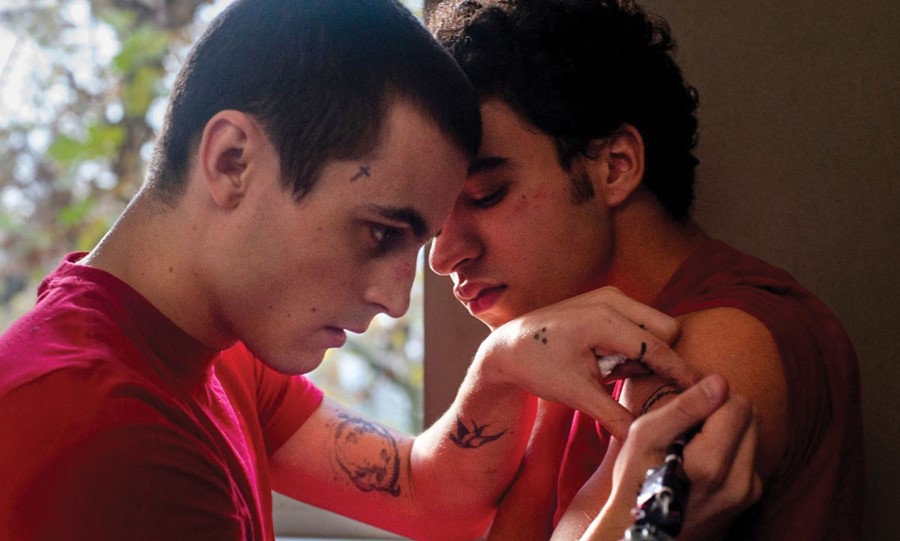We speak to Belgian filmmaker Zeno Graton about his debut feature film, ‘a real romantic drama’ which follows two young offenders
“I was sick and tired of seeing queer Arab characters being only supporting characters,” says the Belgian filmmaker Zeno Graton. “They’re fetishised, exoticised, or victimised. They’re placed in this box that is comfortable for mainstream society to see them.”
As a corrective, Graton, 33, co-wrote and directed The Lost Boys, a gay love story set inside a juvenile detention centre. Titled Le paradis in Belgium, Graton’s absorbing debut feature follows two young men, Joe (Khalil Gharbia) and William (Julien de Saint Jean from Lie with Me), on opposite journeys: William is a newcomer to the facility just as Joe is on the verge of exiting. In this crossover period, they bond emotionally and, when no one’s looking, physically; together, they swap hopes, fears, and even tattoo artwork. It all adds to Joe’s fear that he’s unprepared for a life of freedom outside his cell.
“I wanted to showcase alternative masculinities,” Graton explains to me in Sea Containers Hotel during the London Film Festival. “We use the setting of the centres to talk about tenderness, and not the toxic masculinity that’s often portrayed.” Subsequently, the boy-meets-boy narrative of Graton and Clara Bourreau’s screenplay establishes obstacles that are internal, not external; if other male characters are judgemental, it’s not of anyone’s sexuality.
“Two people falling in love is already a huge story,” says Graton. “There’s so many conflicts. Queer drama is always revolving around the overcoming of shame. But then you see the range of dramas you have in the straight world. Why not have a real romantic drama with two guys? My goal was to touch audiences that aren’t necessarily queer. The power of cinema is to create empathy for people who you are not.”
So far, cinemagoers have been cornering Graton after screenings to regale him with their own tales. The authenticity reflected in the script came from deep research and hearing directly from a cousin who was placed in a youth detention centre in Brussels. “We either hear that it’s a gulag and torturous, or it’s a vacation and too easy,” says Graton. “There’s nothing in between. I tried to portray the grey area.”
Also inescapable was the systemic racism experienced by his cousin. “Western culture is impregnated by its colonial past, and Arab people in France and Belgium are targeted by institutions,” the director says. “The justice system is racist. The police target people in a racist way.” He adds, “But I didn’t want it to be the main subject of the film. I really wanted it to be a love story raising social issues.”
Taking advantage of the claustrophobic setting, The Lost Boys dazzles with close-ups on the faces of its two leads, both exuding angst, frustration, and desire as they simmer in their isolation. During the casting, Graton auditioned actors in pairs before settling on de Saint Jean and Gharbia; when he brought the duo to a facility before the shoot, they witnessed fights and an attempted breakout. “It gave them a sense of duty and responsibility to tell this story,” Graton remarks. “They witnessed what was happening.”
Gharbia has already made a name for himself through the French version of Skam and François Ozon’s Peter von Kant. However, Graton was more enticed by the actor’s understanding of modern masculinity. “Khalil told me that his heroes were David Bowie, Kurt Cobain, and Jim Morrison – all people with alternative, gender-nonconforming ways of presenting themselves. He would wear jewels and, sometimes, nail polish. He wasn’t ashamed to tap into his vulnerabilities, which most guys his age can’t do. You want to pick someone who understands that. It’s not something I can teach them.”
During the writing process, Graton visited facilities to speak to teenagers to finesse how his characters speak, think, and behave; in rehearsals and on set, the director allowed the actors to improvise if necessary. “I saw a lot of young people,” he says. “What struck me was their fierceness; they’re unapologetic about their masculinity. They’re a much more fluid generation than mine. I didn’t want to make invisible the homophobic society we live in. But it was inspiring to see that their generation are freer.”
“My goal was to touch audiences that aren’t necessarily queer. The power of cinema is to create empathy for people who you are not” – Zeno Graton
Graton, though, doesn’t want to explain the film too much, and points to the soundtrack composed by the French-Lebanese musician Bachar Mar-Khalifé as filling in the gaps. “I handed him poems by Rumi, a poet from the Middle Ages who’s known for his writings about Sufism. Sufism is about the body, and reaching God through dance, singing, and the senses. His writings were letters to a male lover. He’s a very queer Arab figure in the Middle Eastern world that I wanted to praise and talk about.”
As such, Mar-Khalifé’s bold, infectious score, complete with jazz and electronic flourishes, conveys the longing of its teenage characters, particularly when Joe and William are in neighbouring cells, separated by a wall, knowing they’re centimetres apart. “I’m half-Tunisian, and wanted the music to reconcile queerness and Arabity,” says Graton. “I wanted to show a proud, leading, queer Arab character in a movie. The music gives strength to this core message.”
He adds, “Too many stories are told by white people who fetishise or victimise other communities. It’s changing because more and more people of colour are taking the camera, and advocating for their stories in the world. That’s what we tried to do.”
The Lost Boys is available to watch in UK cinemas and on digital now.




